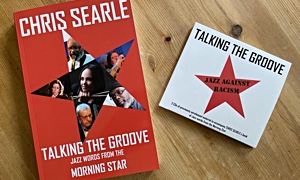Home » Jazz Articles » Book Review » Jazz Icons: Heroes, Myths and the Jazz Tradition
Jazz Icons: Heroes, Myths and the Jazz Tradition
Tony Whyton
Hardcover; 219 pages
ISBN: 978-0-521-89645-0
Cambridge University Press
2010
From relatively early in its history, the so-called jazz community was divided—sometimes bitterly so—over the definition of jazz, and more significantly, over ownership. That much hasn't changed. As academic Tony Whyton states in Jazz Icons: Heroes, Myths and the Jazz Tradition, jazz's history is usually presented as a straightforward, linear development, a tendency which fails to represent the complex skein of musical threads that have combined from the get-go—and expanded ever since—to produce the great mongrel that is jazz.
Whyton's focus is centered on examining the role of jazz's icons as a permeating influence at every level, from the way listeners consume jazz to the constraints imposed on musicians by the weight of canonical works and the deity-like significance that jazz icons have been accorded. The quasi-religious symbolism that genders ritual behavior among musicians and jazz fans alike is, to paraphrase Whyton liberally, a show of blind faith and subservience, which, like the most intolerant of religions, frowns upon dissenters, seeking to banish them from "the community" and even to all but erase them from jazz history.
Whyton's exhaustive research draws from over 220 papers/books including those by historian Eric Hobsbawn, cross-disciplinarian Norman Mailer, jazz writers Stanley Crouch, Scott Devaux and Gary Giddins, biographer Ashley Kahn, writers from beat hero Jack Kerouac to Geoff Dyer, and musicians from trumpeter Wynton Marsalis to saxophonist John Zorn—and a veritable host of musicologists, sociologists, essayists, academics and historians. Whyton succeeds admirably in sieving such dense and diverse source material to present a highly lucid and thought provoking dissection of jazz icons and their significance today. "More than at any other stage in history," Whyton posits, "icons are now arguably the primary influence on the cultural ecology of jazz." An intelligent rather than overtly intellectual discourse, Jazz Icons is also extremely readable.
In highlighting the complexities underlying the representation of iconic jazz artists, Whyton delves into the mystification and glorification of figures such as saxophonist John Coltrane, pianist/composer Duke Ellington and trumpeter Miles Davis, illustrating how they have come to represent a set of idealized values. A central theme in the book is that the romanticized history of jazz has not only created heroic, idealized and predominantly male icons, but that their representations have been "significantly altered to convey an idealized sense of the past, in order to preserve the core values of today." Whyton argues the case that often unsavory aspects of icons' personalities are either reduced in importance or written out of jazz biographies altogether; Ellington's arguably ambiguous personal relationship with Billy Strayhorn and Davis' alleged violence towards women are two such examples.
There are fascinating thoughts on the importance and exploitation of the visual representation of jazz icons, and the significance of the jazz recording as sacred artifact and object of fetishism, which can reduce the music to a position of lesser importance than the fact of its possession. Jazz's uncomfortable relationship with popular culture is brilliantly examined by Whyton in revisiting the Kenny G / Pat Metheny controversy. Jazz—once folk music, once popular culture—has chosen, Whyton argues, to brand itself as high art. The sacralization of jazz has meant that any threat to the iconic message is reacted to as an act of profanity. Guitarist Metheny described smooth jazz saxophonist Kenny G's virtual duet with trumpeter Louis Armstrong almost as a desecration of "hallowed territory," though Whyton's conclusions may make for uncomfortable reading for the Missouri guitarist.
The author's phrase "the myth of authenticity" is also sure to set the teeth of Crouch and Marsalis a-gnashing.
The chapter entitled Dispelling the myth: essentialist Ellington should raise a few storms in teacups at the Lincoln Center and the chapter on the seemingly benign jazz anecdote is also thought provoking. For Whyton, the jazz anecdote plays a significant role in jazz's historical process and has "the ability to construct and perpetuate certain ideological views under the guise of entertainment and impartiality." The contradictions and ironies that have arisen out of the growth of jazz studies are also examined with notable insight in the chapter Birth of the School.
Whyton calls for a more mature approach to jazz history, one which reflects the complexities of jazz and its iconic figures and which engages critically with the music's socio-historical context. Jazz Icons is essential reading for anyone interested in better understanding their relationship with jazz icons and it will no doubt change the way many of us perceive our relationship with jazz. Highly recommended.
< Previous
The Ticket
Next >
Something Quiet
Comments
Tags
Book Reviews
Ian Patterson
wynton marsalis
john zorn
John Coltrane,
duke ellington
Miles Davis,
Billy Strayhorn
Kenny G
pat metheny
(Louis Armstrong
For the Love of Jazz
 All About Jazz has been a pillar of jazz since 1995, championing it as an art form and, more importantly, supporting the musicians who create it. Our enduring commitment has made "AAJ" one of the most culturally important websites of its kind, read by hundreds of thousands of fans, musicians and industry figures every month.
All About Jazz has been a pillar of jazz since 1995, championing it as an art form and, more importantly, supporting the musicians who create it. Our enduring commitment has made "AAJ" one of the most culturally important websites of its kind, read by hundreds of thousands of fans, musicians and industry figures every month.






















